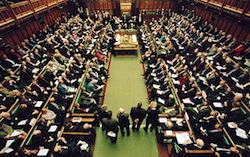UK Conservatives: Reducing Nuclear Threats is "Vital National Interest"
March 17, 2010
Featured Image
We are happy to serve you a daily summary of the day's top nuclear policy stories each morning, with excerpts from the stories in bullet form.
Stories we're following today:
Nuclear Proliferation Speech at the Royal Society - David Lidington MP's blog [link]
- David Lidington MP, Shadow Minister for foreign affairs gave a speech yesterday in which he stated the Conservative Party's support for Obama's goal of a world without nuclear weapons.
- He also spoke in favor of US steps to get there: "We say to our friends in Washington that we believe that a new START treaty and American ratification of the Comprehensive Test Ban Treaty are in the interests of the United Kingdom."
- "Reducing the risk posed by weapons of mass destruction and nuclear weapons in particular is not a party political issue but a vital national interest which needs a common purpose and a shared vision," he said.
- To read the full speech, download the word document here.
Russia Sees U.S. Nuclear Arms Deal Soon: Agencies - Reuters [link]
- "The end of March-April -- those are the dates when, if the delegations firmly follow the directives of the presidents, they will finish preparing the [new START] treaty," Itar-Tass quoted Russian Foreign Minister Sergei Lavrov as saying.
- He went on to say: "When and where it will be signed is for the presidents to decide."
- Lavrov's remarks suggested the pact could be ready for signing before a nuclear security summit planned by Obama in Washington in mid-April.
- Lavrov said much of what remained to be done to prepare the pact for signing entailed putting agreed points "in treaty language" and editing the text, Russian news agencies reported.
The Homestretch for START - Daryl Kimball in the Moscow Times [link]
- Friday’s visit to Moscow by Secretary of State Hillary Clinton provides a critical opportunity to tie up the few loose ends on the negotiations and finally close the deal on the new START.
- While the new START should acknowledge the principle that strategic missile defense can affect the offensive strategic balance, it is neither realistic nor necessary to burden this treaty with the task of limiting missile defense options that will not materialize for well over a decade.
- Before the end of March, Obama and Medvedev must close the deal in order to maintain common-sense controls on the world’s largest and most lethal nuclear arsenals and set the stage for closer U.S.-Russian cooperation on a range of other global challenges.
Iran Nuclear Weapon Development Has Slowed: U.S. - Reuters [link]
- The pace of Iran's nuclear weapons development appears to have slowed, buying time for a new round of sanctions now and possibly more sweeping measures further down the road.
- [Dennis Blair, Director of National Intelligence] said Iran appeared to be "experiencing some problems" at the enrichment facility at Natanz and was operating only about half of the installed centrifuges.
- While nuclear development may have slowed by some estimates, Washington believes Iran continues to expand the scale, reach and sophistication of its ballistic missiles.
- Vice President Joe Biden, in an interview with Reuters at the end of his Middle East tour, said the Obama administration's outreach to Iran, dismissed by some as naive, helped galvanize the international community to address the Iranian issue.
Keep Your Rosaries Off My Deterrence - Kingston Reif and Travis Sharp in DOD Buzz [link]
- Kingston Reif and Travis Sharp offer a rebuttal to the recent commentary [in DOD Buzz] from the folks at the Heritage Foundation.
- It may offend [Baker] Spring’s and [Helle] Dale’s moral sensibilities, but the fact remains that the United States is, and will continue to be, vulnerable to nuclear attack so long as nuclear weapons exist.
- Dumping tried and true deterrence and arms control strategies that manage and minimize nuclear dangers in favor of an uncertain missile defense-centric approach, as Spring and Dale recommend, would needlessly endanger U.S. security.
- The technology required to intercept a large number of long-range missiles equipped with decoys and countermeasures does not exist and may never exist.
- A START follow-on agreement offers attractive security benefits for the United States. Its new limits and streamlined verification provisions will ensure a stable and predictable U.S.-Russian nuclear relationship.



